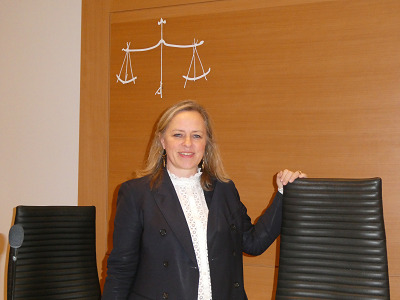Anne-Claire Le Bras: “IP courts will be well-staffed for emergencies during the Olympics”
The 3rd chamber of the Paris Judicial Court, which is responsible for French IP litigation, is fully staffed once again. JUVE Patent spoke to Anne-Claire Le Bras, president of the 3rd Chamber since September 2023 and successor to Nathalie Sabotier, about her goals as president and how preparations for the Olympic Games in Paris are impacting the judiciary.
17 April 2024 by Konstanze Richter
JUVE Patent: What are your goals as the new president of the 3rd chamber?
Anne-Claire Le Bras: It is very important to me to promote exchange between judges and lawyers. Nowadays they hardly ever meet in person aside from the oral hearings and judicial meetings organised by the judge to discuss a difficulty in the progress of the case or to organise the conduct of the proceedings.
For example, case management proceedings, which used to take place in person, are now done in writing. In addition, the pandemic – and not least the move to the new building – means less personal contact. Many lawyers complain that they have lost contact with the judges. We understand their desire for a more frequent personal exchange and would like to enable this.
Which measures are you planning for this?
The Ministry of Justice traditionally organises regular meetings with the legal profession across all areas of law in the individual court districts. An astonishing number of IP lawyers attended one such breakfast in March, which shows how great the interest is. I would therefore like to organise similar meetings for professionals from our speciality to promote the exchange of ideas.
We would also like to raise communication in general to a personal level again: for example, if we have questions about a saizie contrefaçon, we would rather pick up the phone than write an email. The latter is also a proposal from the protocol for the evolution of procedural practice, which was developed by the legal profession and judiciary together with my predecessor Nathalie Sabotier.

Anne-Claire Le Bras
What are the main points of the protocol?
It makes recommendations for the efficient management of cases at the 3rd chamber. It defines guidelines for seizures (saizie contrefaçon), the case management system, the sequencing of proceedings and for fast-track proceedings. The aim is to make procedures more efficient.
One core element is the agreement on participatory pre-trial proceedings (in French: convention de procédure participative de mise en état). This allows lawyers for the disputing parties communicate with each other to coordinate the timing of their brief submissions. In the conventional case management system, judges carry out this type of coordination.
What impact will this have on the course of proceedings?
If the judges no longer have to perform these administrative tasks, and which party will submit which briefs it is already clear at the start of proceedings, then we can schedule the oral hearing more precisely and reliably. However, this presupposes that the lawyers trust each other and do not delay the proceedings with additional submissions or procedural tactics.
In recent years, the number of new patent disputes filed at the Tribunal Judiciaire has risen continuously. How do you calculate them?
As a rule, each case is counted individually, i.e. per patent-in-suit and opposing party. In other words, if a patent owner sues several parties on the basis of several patents, such as an originator against several generics manufacturers, each case is given its own file number and the court counts it as one procedure. This is also the case if, for example, the court decides on several proceedings relating to one and the same patent in one day.
With the Olympic Games taking place in Paris from 22 July to 11 August, an increasing number of IP disputes are expected in this context. How is the chamber preparing?
The games coincide with the main vacation period in France. Even in normal years, no oral hearings on extensive IP disputes are scheduled during this period, as many judges also take their summer vacation. During this time, judges from other specialties are usually available to help in emergencies, for example if a saizie contrefaçon or preliminary injunction is required due to an impending patent infringement. In the same way, judges from the 3rd chamber help in other chambers in urgent cases to bridge the bottlenecks in summer.
This usual practice will be suspended for the 3rd chamber during the Olympic Games. Unlike in other years, they will not be helping out in other chambers. This means that, despite the vacation period, enough experienced IP judges will be available for emergencies, such as infringements of broadcasting rights or trademark counterfeiting.
So, virtually nothing changes for the parties in patent disputes compared to other years, as no major main hearings take place during the holiday period anyway. And, thanks to more precise coordination of the judges concerning vacations, the chamber should always be so well staffed that sufficient capacity is available even for emergencies outside of the Olympic Games.
